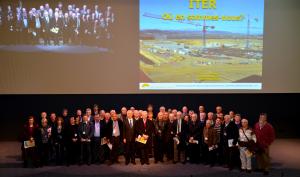53 mayors who are also "partners"
12 Mar 2013
Following presentations in the ITER amphitheatre, the 53 mayors toured the ITER site to see the status of construction.
There are more municipalities in France than in all of Europe combined.
Every village, however sparsely populated, is a municipality in its own right and every municipality follows the same procedure to elect its municipal council every six years: at its first meeting, the new municipal council elects the mayor, or "First Magistrate."
Whatever the size of the constituency, madame or monsieur le maire is a major figure in the administrative organization of French society.
ITER was honoured, on Monday 11 March, to welcome no fewer than 53 mayors from neighbouring municipalities—from the smallest (Valavoire, pop. 32) to the largest (Sisteron, pop. 7,500).
Led by Daniel Spagnou, mayor of Sisteron and president of the Association of Mayors of the Alpes-de-Haute-Provence département, the 53 mayors were given a presentation on ITER by Director-General Osamu Motojima and a quick round-up by Agence Iter France director Jerôme Paméla.
"You are our partners in this scientific venture," DG Motojima told the mayors. "Once ITER has demonstrated the technical and scientific feasibility of fusion energy it will be your responsibility, as representatives of the people, to decide on the next steps that will be taken."
Monday 11 March was the second anniversary of the Great East Japan earthquake, tsunami, and resulting nuclear accident at Fukushima—Director-General Motojima insisted during his talk on the fundamental differences between fusion and fission in terms of safety. "A Fukushima-like accident cannot happen in a fusion installation," he stressed.
In 2003, the Alpes-de-Haute-Provence département (pop. 160,000) pledged EUR 10 million to the ITER project. It turned out to be a sound investment: to date, companies based in the département have benefitted from contracts amounting to EUR 29 million.


